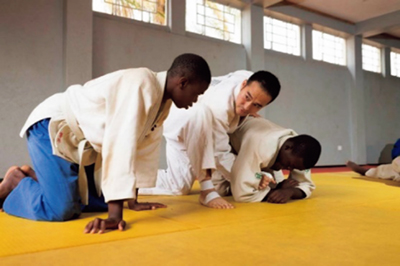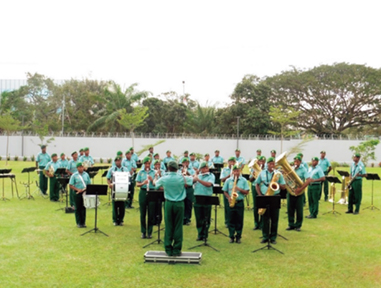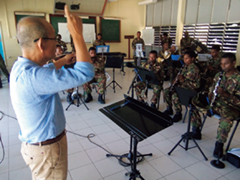(5) Culture and Sports
In developing countries, there is a growing interest in the preservation and promotion of their own cultures. Cultural heritage that symbolizes a country is a source of pride for people, and, as tourism resources, can be effectively utilized to develop the socio-economic environment of the residents in the surrounding areas. On the other hand, there are also a number of cultural heritage sites that are exposed to an existential crisis due to the lack of funds, equipment, technology, etc. Assistance to protect such cultural heritage directly reaches the hearts of the people in recipient countries and has long-lasting effects of cooperation. In addition, the preservation and promotion of culture, such as invaluable cultural heritages that are shared by all humankind, is an issue that should be addressed not only by the countries with cultural heritage in danger, but also by the entire international community.
Moreover, interest in the promotion of sports is also growing in developing countries. Sports can enhance the quality of people’s lives, as they cultivate a sense of respect for opponents, a spirit of mutual understanding and awareness of norms, as well as help maintain and improve health. The influence and positive power of sports play the role of “catalyzer” for the development and growth of developing countries.
●Japan’s Efforts

A Japan Overseas Cooperation Volunteer (JOCV) teaching judo techniques to students in Malawi.
Japan has provided assistance for the promotion of culture and higher education, as well as the preservation of cultural heritage, and promotion of sports in developing countries, through the Cultural Grant Assistance* since 1975. Specifically, Japan has constructed facilities necessary for preserving and utilizing cultural heritage and cultural properties, sports and cultural facilities, and facilities of higher education and research institutions in developing countries. Japan has also provided necessary equipment for these facilities (see the column for details). Such facilities built in developing countries also serve as hubs for spreading information about Japan and holding cultural exchanges with Japan, as well as deepening understanding of Japan and fostering a sense of affinity toward Japan.
In 2019, Japan approved 17 projects to provide support in the fields of education, including Japanese language education, broadcasting and publishing, and sports under the Cultural Grant Assistance. Furthermore, Japan continued its proactive efforts to provide sports assistance using ODA and “Projects for Sports Diplomacy Enhancement” to advance “Sport for Tomorrow,” a program launched for the purpose of international contribution through sports, with which Japan shares the value of sports and spreads the Olympic and Paralympic movement as the host country of the Olympic and Paralympic Games Tokyo 2020 (see “ODA Topics” for details). In addition, Japan has dispatched 214 JICA Overseas Cooperation Volunteers (JOCVs) in the field of sports.
Moreover, Japan provides support for the restoration and preservation of cultural heritage, including equipment provision and preliminary studies and surveys, through the “Japanese Funds-in-Trust” established in the United Nations Educational, Scientific and Cultural Organization (UNESCO). Placing a particular emphasis on human resources development in developing countries, based on the idea of enabling people in these countries to protect the cultural heritage of their own country by themselves in the future, Japan also endeavors to dispatch international experts, mainly Japanese experts, as well as hold workshops in order to transfer the technology and expertise to developing countries. In addition to tangible cultural heritage, Japan also supports the safeguarding of intangible cultural heritage such as traditional dances, music, handcraft techniques, and oral lore (oral traditions) by implementing successor training, records conservation, the creation of safeguard mechanisms, and other activities through the above-mentioned Funds-in-Trust.
Furthermore, Japan is also conducting training programs with the aim of improving capabilities for the protection of cultural heritage by inviting young experts involved in cultural heritage protection from the Asia-Pacific region to Japan as part of the “Project for the Promotion of Cooperation for the Protection of World Heritage and Other Cultural Properties in the Asia-Pacific Region.” In addition to conducting biennial training on maintenance and repair methods for wooden buildings and survey records of archeological remains, a training on museums and a workshop in Cambodia were conducted for experts in Central Asia in 2019.
Papua New Guinea Public nomination
Assistance to the Papua New Guinea Defence Force Military Band
Dispatch of JICA expert on Capacity Development of the PNG Military Band (March 2017 - March 2019)
Grant Assistance for Cultural Grassroots Projects (August 2017)
In November 2018, Papua New Guinea hosted the Asia-Pacific Economic Cooperation (APEC) Summit for the first time as the chair in its capital, Port Moresby. On the occasion of the gala dinner, the Papua New Guinea Defence Force (PNGDF) Military Band performed to welcome heads of states upon their arrival at the venue. When Prime Minister Abe and his wife arrived, the Japanese children’s song “Furusato” was performed to welcome them.
Japan has been providing assistance to the PNGDF Military Band since it was established in January 2017. As part of Japanese assistance to the government of Papua New Guinea, which served as the APEC Chair in 2018, Japan supported the Military Band to help them perform at a series of APEC events. When the Military Band was first formed, most of the members could not read a musical score, and it was their first time even holding wind instruments. However, through Japan’s assistance, the Military Band drastically improved their skills, and became capable of performing at official APEC events in less than two years.
Since January 2017, training teams of the Japan Ground Self-Defense Force (JGSDF) Central Band were dispatched to Papua New Guinea over ten times to provide music lessons for several weeks. Moreover, in March 2017, Mr. MIZUSHINA Katsuo, a JICA expert and a former leader of the Japan Air Self-Defense Force Central Band, was dispatched to Papua New Guinea to provide technical assistance on performance in coordination with the training provided by the JGSDF Central Band teams for two years. A set of new musical instruments was also provided through the Grant Assistance for Cultural Grassroots Projects, and a set of used instruments was donated by Sendai Ikuei High School, which has a sister school in Port Moresby. In addition, the Japanese government held a nationwide composition contest in Japan and presented the Military Band with “March Port Moresby,” a march to be performed at APEC official events. This march is still played at various official events.
Through the support from Japan, the Military Band actively continues to perform while regularly receiving music lessons from the JGSDF Central Band even after completion of the JICA expert dispatch period. In October 2019, the Military Band was invited to Sydney to participate in the Royal Edinburgh Military Tattoo, a showcase for military bands from around the world.
As can be seen from the fact that the tremendously improved Military Band is loved by the people of Papua New Guinea, as well as expanding its fields of activity, it is considered as one of the achievements of Japanese assistance on human resource development.

The Military Band performing at the Japanese Ambassador’s residence in Papua New Guinea (Photo: JICA)

JICA expert Mizushina giving instructions to the Military Band on their performance (Photo: JICA)
- *Cultural Grant Assistance
- Cultural Grant Assistance are grants provided to procure equipment and supplies, and improve facilities for the promotion of culture and higher education in developing countries. It is intended to encourage cultural and educational advancements in developing countries as well as cultural exchanges between Japan and these countries, with a view to deepening friendships and mutual understanding. This cooperation includes Cultural Grant Assistance, which provides assistance to governmental organizations of developing countries, and Grant Assistance for Cultural Grassroots Projects, which provides assistance to NGOs and local public entities for small-scale projects.
